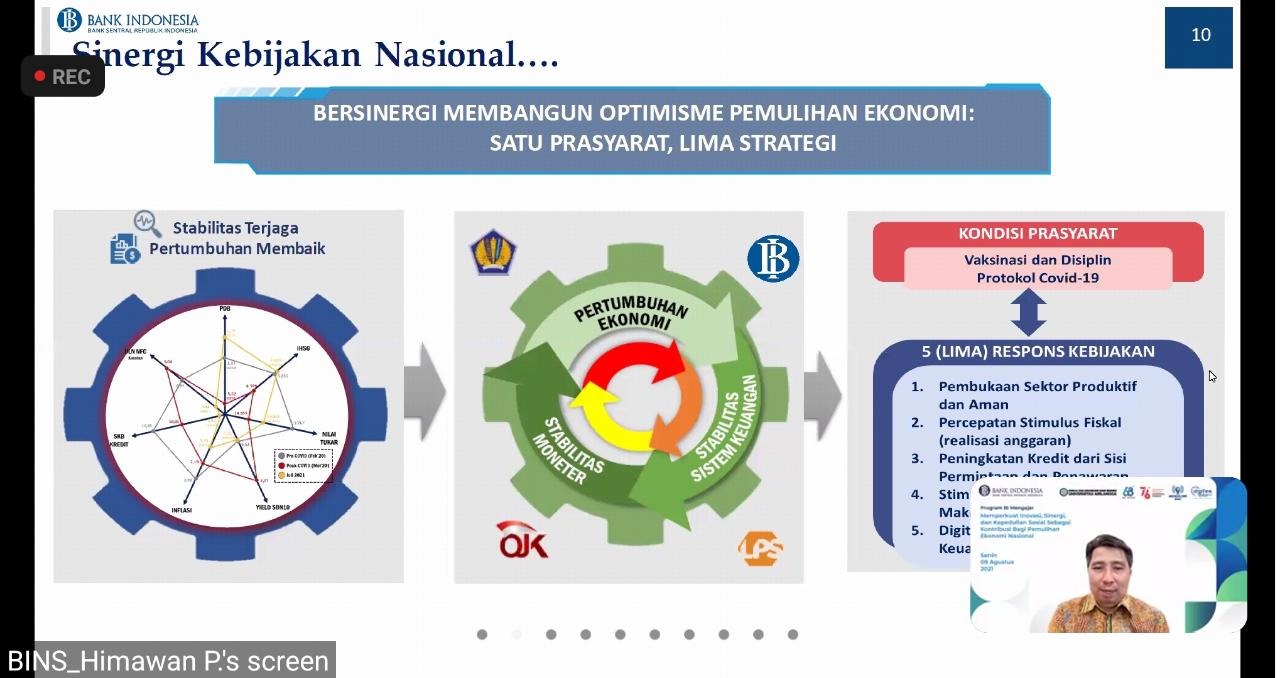UNAIR NEWS- On the 60th Anniversary of the Faculty of Economics and Business, Universitas Airlangga (FEB UNAIR), FEB UNAIR collaborated with Bank Indonesia (BI) to hold a Bank Indonesia Mengajar (Bank Indonesia Teaching) webinar. The webinar presented Dr, Solikin M. Juhro as the Head of the Bank Indonesia Institute.
Conducted online via Zoom platform, Dr. Solikin delivered a material entitled ‘Strengthening Innovation, Synergy, and Social Awareness as Contributions to National Economic Recovery’ on Monday, August 9, 2021. Also attending the webinar was the dean of FEB UNAIR, Prof. Dr. Dian Agustia, SE., M.Si., Ak., CMA., CA.
Dr. Solikin explained that initially, BI wanted to build a modern central bank paradigm. BI then came to achieve and maintain the stability of the Indonesian Rupiah.
The stability of Rupiah can be viewed from two dimensions. The first is the value stability of Rupiah against goods and services as measured by the development of the inflation rate. Second, by looking at the stability of Rupiah against other countries’ currencies as measured by the development of the exchange rate.
“The ultimate goal is to support a healthy, sustainable, and inclusive economic growth,” explained Dr. Solikin.
Dr. Solikin, who is also the Chair of the Universitas Airlangga Alumni Association (IKA-UA) Jakarta branch, then explained the main task of BI. According to him, BI has the task of establishing and implementing monetary policy, regulating and maintaining the smooth running of the payment system, and maintaining the financial system’s stability (macroprudential).
Developed countries are reflected by the high complexity of the products produced by the country. If Indonesia can produce complex products with high ‘added value,’ it can be said that Indonesia has become a developed country.
“In order to become a developed country, Indonesia must be able to manage resources and manage people’s behavior (lifestyle, ed),” added Dr. Solikin.
Furthermore, Dr. Solikin said that the main key in the development strategy is to build optimism for the economic recovery with the 1+5 strategy, one prerequisite, and five strategies. The prerequisite condition that must be met is vaccination and the discipline to obey the Covid-19 Health and Safety Protocols.
“While the five policy responses are the opening of productive and safe sectors, acceleration of fiscal stimulus, increasing credit from the demand and supply side, monetary stimulus and macroprudential policy, and the digitalization of the economy and finance, especially MSMEs,” explained Dr. Solikin.
At the end, Dr. Solikin explained that the synergy and policy innovations carried out for economic recovery can be broken down into five things: monetary policy, relaxation of macroprudential policies, digitization of the payment system, development of MSMEs, and development of the Sharia Economy.
“Bank Indonesia must be a relevant regulator and never be outdated. To face the digital era, Bank Indonesia must implement new and more modern practices,” concluded Dr. Solikin.
Author: Sandi Prabowo
Editor : Binti Q. Masruroh (AC/AP)





